DARRELL GWYNN SHINES IN THE FACE OF ADVERSITY
 speeding 290 miles-an-hour across the
finish line.
speeding 290 miles-an-hour across the
finish line. “It’s like winning a race today,” the former National Hot Rod Association world champion told the parents of the bright, blue-eyed 2-year-old with a debilitating muscular disease, as she zipped across the living room in her new $26,000 motorized wheelchair.
Until then, Madison Smith -- suffering from a hereditary disorder that prevents her from crawling, walking or running -- could hardly move on her own in her suburban Fort Lauderdale, Fla. home.
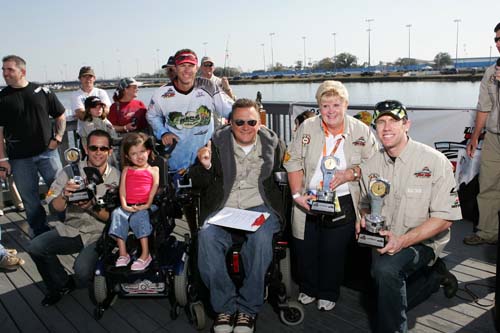
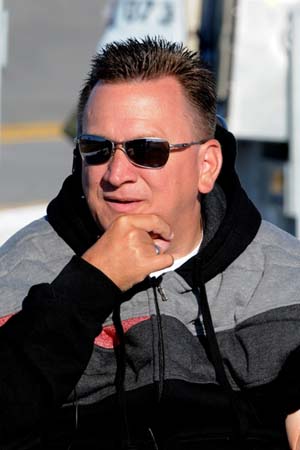 As he prepared to donate a custom wheelchair to a crippled child, Darrell Gwynn flashed back to speeding 290 miles-an-hour across the finish line.
As he prepared to donate a custom wheelchair to a crippled child, Darrell Gwynn flashed back to speeding 290 miles-an-hour across the finish line.
“It’s like winning a race today,” the former National Hot Rod Association world champion told the parents of the bright, blue-eyed 2-year-old with a debilitating muscular disease, as she zipped across the living room in her new $26,000 motorized wheelchair.
Until then, Madison Smith -- suffering from a hereditary disorder that prevents her from crawling, walking or running -- could hardly move on her own in her suburban Fort Lauderdale, Fla. home.
Her circling the living room and kitchen without any help was indeed a race won for Gwynn, a quadriplegic confined to a wheelchair following a devastating 1990 racing exhibition. The Miami native is now racing to give away top-of-the-line wheelchairs to as many children and young adults as he can. So far, he has donated 70 wheelchairs through his foundation since leaving racing.
“It’s so special when you can do this for a young child,” Gwynn said, a boyish grin stretched across his face. “They have the rest of their lives. They can now go to school, carry their books. Someone doesn’t have to push them to class all the time. They can be independent.”
Perhaps no moment better captures the famous racer’s rebirth as a benefactor and spinal cord injury advocate than this, sitting in the living room of a family touched by tragedy and giving their loved-one a chance to move about on her own --- the gift of freedom.
It’s a gift Gwynn has taken to heart after losing his left arm and becoming paralyzed from the waist down. He got a powerful wheelchair following his crash, but soon noticed, when he returned to watch racing from the sidelines, the legions of disabled fans in the stands confined to substandard wheelchairs.
“It was horrible. Those were their wheels. They were shoddy,” Gwynn said.
This month, after Gwynn returned to Gatornationals on the 20th anniversary of first winning the race in front of his home state crowd and going on to win U.S. Nationals and Keystone Nationals the same year, he donated yet another wheelchair in front of thousands of fans. This time, the recipient was a 39-year-old former dirt track racer from Alabama who become a paraplegic in a motorcycle crash last year.
The moment was bittersweet.
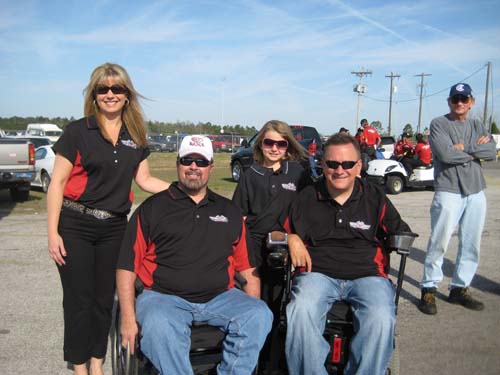
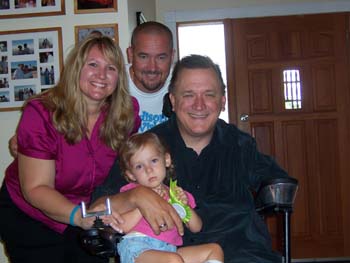
During an exhibition race in London, the chassis of his hot rod, weakened by the trans-Atlantic flight, snapped causing Gwynn’s dragster to hit the wall in a horrific Easter Sunday crash.
With his then-fiancé Lisa Hurst by his side, he spent six weeks in a London hospital ward packed with more than 80 floral arrangements and 500 pounds of well-wishers’ cards. About 200 friends greeted the couple at the Miami airport after an 11-hour trip to a hospital closer to home.
He knew he would never race again. He found strength from the support of all the people who helped him become a champion.
“I barely had a moment to be by myself and cry,” Gwynn said. “I didn’t have a lot of time to get down. There was always someone in the hospital room. When someone went to the bathroom, someone else was with me. That’s about as long as I was alone. There were so many caring people, including people from all over the country. They kept me going through the worst part of it.”
After leaving the hospital months later, he kept his racing team going. Besides his family and supporters, drag racing was his reason to continue living. The sport was in his blood. At age 7, he drove a scaled-down dragster designed and hand-built by his father, Jerry, a drag racing champion in the 1970s. Jerry Gwynn coached the youngster to his triumphs, and eventually become the full-time manager of Darrell Gwynn Racing Team.
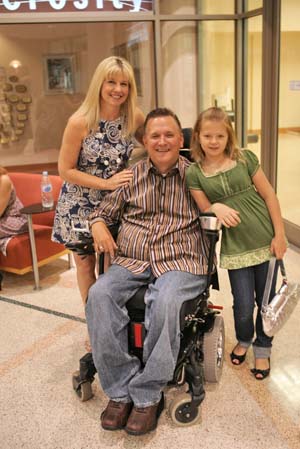
Watching his race team from the sidelines, Gwynn also caught sight of the outdated wheelchairs in the stands at just about every race he attended. Many disabled fans, he realized, were stuck in these wheelchairs because they couldn’t afford modern models.
He convinced his team’s sponsors to give away custom wheelchairs to a few lucky fans. But the need was much greater. The stands were filled with rickety wheelchairs. He was moved to find another way to help a lot more people.
So in 2002, he launched a Davie, Fla.-based foundation to raise money to donate wheelchairs, provide long-term services for new spinal cord injury patients, fund paralysis research and decorate pediatric hospital units. Soon after, the Darrell Gwynn Foundation convinced lawmakers to enact Florida Spinal Cord Injury Awareness Week as a way to get the public involved and educated about ways to avoid paralyzing injuries.
“We started giving away wheelchairs at big races. People in the stands went nuts. The press covered it like crazy. It was a natural giving back,” Gwynn said. “People kept asking me, ‘What kind of wheelchair should I buy? What hospital should I go to?’ I couldn’t answer these questions. We formed the foundation because we saw so many people in need. We knew we had a niche to raise money and help a lot of people.”
Word of the foundation’s work spread fast. Some of the biggest names in NASCAR began taking part in the group’s fund-raising “Hot Rods & Reels” celebrity fishing tournaments in Daytona, Fla. and Homestead, Fla. This year, NASCAR legends “The King” Richard Petty and Sprint Cup Champion Tony Stewart helped raise $900,000 for the foundation during the auction of two racing cars at the Barrett-Jackson Collector Car Event in Scottsdale, Ariz.
To date, the group has raised more than $3 million to assist those with spinal cord injuries and debilitating disease, Gwynn said.
“Darrell loves people,” his wife, Lisa, said. “He’s got an ability to make a special connection. He makes people feel at ease and that they matter. He started this as a side thing to give something back. Now, it’s a full-time job. Nobody can motivate people the way he can.”
One of the hardest parts about being paralyzed, Gwynn said, is missing out on simple pleasures with his daughter, Katie, 12. He regrets not being able to go bike riding with her or taking her out for ice cream. He depends on a group of off-duty firefighters to help him out of bed, brush his teeth, feed him breakfast, and get through the day.
Still, as tough as life has been for Gwynn, he sees his charity work as a destiny, a way to give the gift of freedom to disabled children and young adults across the country.
“This isn’t some club I signed up for. But it’s a damn good replacement. At the end of the day, when it’s all said and done, it has a lot more meaning,” he said.



































